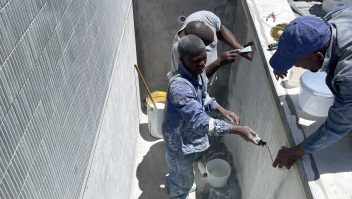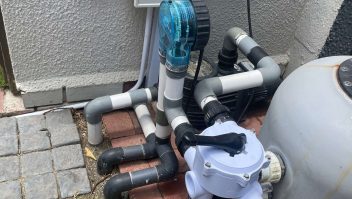In Cape Town’s climate—where summers are hot and winters are cool—extending your pool season is both desirable and practical. Installing an energy-efficient pool heating system ensures you get the most enjoyment out of your investment. The two most popular options for residential and commercial properties in the Western Cape are pool heat pumps and solar pool heating systems. Here’s a detailed comparison and guide to help you choose the best option.
Why Invest in Pool Heating?
- Year-round comfort: Enjoy your pool during cooler months.
- Increased property value: Heated pools are highly attractive to buyers and renters.
- Health and therapy: Warm water is ideal for fitness, recovery, and relaxation.
Pool Heat Pumps in Cape Town
How They Work
A pool heat pump works like an air conditioner in reverse, extracting heat from the air and transferring it to the pool water. They function efficiently even in Cape Town’s mild winter temperatures.
Installation Process
- Location: Needs to be installed in a well-ventilated, sunny outdoor area.
- Timeframe: Installation typically takes 1–2 days.
- Requirements: Compatible with your pool’s filtration system and requires a stable electricity supply.
Cost
- Unit Price: R18,000 – R45,000 depending on size, efficiency, and brand.
- Installation Fees: R3,000 – R7,000 based on plumbing and electrical complexity.
Pros
- Energy-efficient (uses ambient air, not fuel)
- Consistent performance in varying weather
- Temperature control with digital thermostats
Cons
- Higher upfront cost than solar
- Electricity usage adds to monthly bills
Maintenance
- Clean filters and coils regularly
- Inspect for debris and ensure proper airflow
- Annual professional servicing recommended
Solar Pool Heating Systems in Cape Town
How They Work
Solar pool heating uses panels (collectors) mounted on your roof or ground space. Pool water is pumped through these panels, where it absorbs solar energy before returning to the pool.
Installation Process
- Panel Placement: South-facing roofs in Cape Town provide optimal sun exposure.
- Timeframe: 1–3 days depending on roof type and access
- Requirements: Adequate space for panels, compatible pump/filter system
Cost
- System Price: R12,000 – R30,000 for an average residential pool
- Installation Fees: R3,000 – R5,000
Pros
- Low running cost (uses free solar energy)
- Eco-friendly and reduces carbon footprint
- Long-term savings on heating bills
Cons
- Weather-dependent (limited on cloudy or rainy days)
- Slower heating compared to electric systems
- Requires roof space
Maintenance
- Minimal maintenance; inspect panels seasonally
- Flush system occasionally to prevent clogs
- Check for leaks or panel cracks
Which Pool Heating System is Best for Cape Town?
| Feature | Heat Pump | Solar Heating |
|---|---|---|
| Initial Cost | Higher | Lower |
| Running Cost | Moderate (electricity use) | Minimal (solar energy) |
| Performance | Reliable in all weather | Weather-dependent |
| Maintenance | Moderate | Low |
| Environmental Impact | Low emissions | Zero emissions |
| Heating Speed | Faster | Slower |
Frequently Asked Questions
Can I use both heat pump and solar heating together?
Yes! A hybrid system uses solar for most heating and supplements it with a heat pump during cloudy days or nights.
How much will it cost to run a heat pump monthly?
Depending on usage and pool size, expect R400–R1,200/month in electricity costs. Variable-speed pumps can reduce this significantly.
Will solar heating work in winter?
Yes, but with reduced efficiency. The system depends on solar availability. Many users pair it with a pool blanket to retain heat.
Is a heat pump noisy?
Modern heat pumps are quiet and typically run at 40–60 dB—comparable to a dishwasher.



